Investors are worried that the same AI stocks that have driven markets higher in 2024 may be a bubble. Inflation is cooling, standing at 3% as of July 11. The Federal Reserve may be cutting interest rates later this year that would spur economic growth. So, although the news is encouraging, wisdom dictates to safeguard your portfolio.
So now seems an excellent time to consider purchasing sturdy recession-proof stocks. Let’s look at some popular choices.
Walmart (WMT)

Logically speaking, Walmart (NYSE:WMT) is a stalwart for your portfolio in 2024 and beyond. The more difficult the economy becomes, the more cautious consumers become. That means they are more likely to become price sensitive and seek out bargains. What better place than Walmart to satisfy those factors?
Also, Walmart continues to thrive based on its most recent earnings report. Revenues increased by 6% in the first quarter while earnings ballooned by more than 22%.
It’s further evidence that Walmart is among a special cadre of companies that performs well in most macroeconomic conditions. Interested investors should look to Walmart’s e-commerce efforts and grocery segments as reasons to invest.
Furthermore, WMT’s e-commerce segment grew by 21% globally in Q1. Part of that growth is due to the company’s continued dominance in the grocery sector. Walmart has had to open additional distribution centers across the U.S. to keep up with online growth. Thus, Walmart looks good for a number of reasons, its status is a recession proof stock being one of them.
NextEra Energy (NEE)
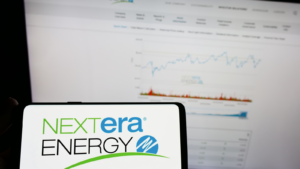
NextEra Energy (NYSE:NEE), like many other utilities companies, is bound to show up in articles discussing recession proof stocks. It’s one of two utilities firms that will be discussed here.
Historically, utilities companies tend to do well in recession because the demand for power is relatively inelastic. People everywhere require power whether times are good or bad.
That’s one of the broad reasons to consider NextEra Energy. And, it is one of the biggest public utilities companies and renewable energy firms.
Also, NextEra Energy produces significant amounts of renewable energy through its solar and wind energy business. Energy demand is surging due to artificial intelligence (AI) growth, especially at the data centers. Large hyperscaler firms have promised to reduce their carbon emissions while simultaneously consuming much more power. The same firms have landed on renewable energy as the solution. That suggests NextEra Energy will continue to do well while providing downside protection through its utilities business.
Coca-Cola (KO)
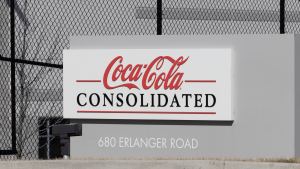
Coca-Cola (NYSE:KO) is a steady growth cash cow stock that performs well all the time. Annual revenues are expected to continue growing in the three to five percent range for the next several years. Earnings growth is expected to be a few percentage points higher than that.
There’s nothing particularly exciting about Coca-Cola in terms of its business. It’s a company that has perfected its recipe for predictable growth and reliable dividend generation. Coca-Cola is a company that’s steadily highly profitable and that shows up in the metrics.
For example, Coca-Cola’s gross margin is better than 91% of its competitors. So, Coca-Cola enjoys pricing power that gives the company a moat financially. Its brand power has developed over several decades resulting in pricing premiums that create incredible internal economics for the company. That’s exactly the reason it’s one of the favorites of Warren Buffett.
In recessionary times consumers regard Coca-Cola as a splurge treat. It enjoys the same status in stronger economic periods as well.
AbbVie (ABBV)
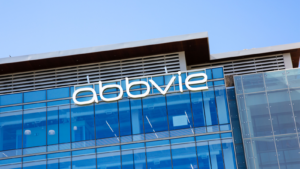
Also, AbbVie (NYSE:ABBV) enjoys relatively inelastic demand across macroeconomic conditions. Healthcare stocks and utilities stocks benefit from steady demand for similar reasons. People need electricity and people need healthcare regardless of the state of the economy.
Thus, pharmaceutical companies such as AbbVie tend to do very well in recessions. Another reason to consider investing in ABBV is that it continues to navigate declining sales of its blockbuster drug, Humira, very well.
The company appears to enjoy success over the long-term. That shows up in metrics like a return on equity that is among the best for drug manufacturers. Therefore, shareholders who buy ABBV stock are rewarded with high returns.
The company continues to navigate through rough waters as Humira continues to come off patent. Sales are essentially flat but that is actually quite the feat given how much Humira meant to the firm. Invest in the company because it has found other revenue streams and includes a dividend that is extra attractive if and when a recession begins.
Costco (COST)
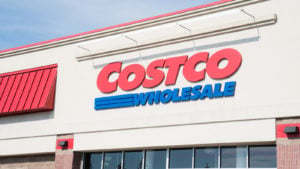
Costco (NASDAQ:COST) shields and protects your portfolio for obvious reasons. If a recession begins, demand for bulk goods is likely to rise.
That isn’t to say that demand for Costco’s products and services isn’t already high. It is. The company releases monthly sales figures. Figures from June show that total revenues continue to rise by more than 5%. Costco’s e-Commerce efforts are especially strong with sales continuing to grow near the 20% mark.
Also, Costco is expected to continue growing at an annual rate of roughly 7% over the next several years. Earnings growth is expected to run slightly higher, in the range of 10% over the same period.
There’s little reason to believe that Costco will be anything but a strong investment overall. It is fully priced at the moment but I wouldn’t be surprised if analysts upgrade their target prices.
Dollar General (DG)
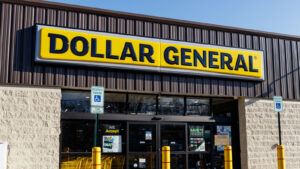
Dollar General (NYSE:DG) has been likened to the pulse of the paycheck-to-paycheck consumer. The stock represents a consumer retailer targeting lower income consumers.
The company continues to see large shifts that suggest it is a go-to for recession proofing portfolios. While the average spend per consumer fell during the first quarter, the company still managed to exceed sales expectations on much greater traffic.
Meanwhile, operating profits declined substantially, due to downward pricing pressure and inventory shrinkage (theft). In response, Dollar General has shut down self checkout kiosks at more than 12,000 stores.
Fortunately for Dollar General, theft issues have not prevented the company from attracting new customers. The company attracts new customers across all demographics while maintaining its core customer group.
The reduction in self checkout kiosks should go a long way in improving Dollar General’s results moving forward. It is certainly not the only retailer dealing with a surge in theft. It continues to be a strong recession proof stock overall.
Southern Co. (SO)
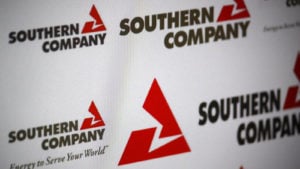
Southern Co. (NYSE:SO) is a utilities stock and as discussed, utilities stocks perform well in recessions.
Currently, SO stock is fully priced, which may act as a detractor to some investors. However, the company continues to pay a dividend yielding approximately 3.7%. The dividend was last reduced in 1986 so it’s likely a safe bet.
In addition, projected sales in earnings growth are exceptionally steady which is no surprise given its utilities stock status. The Southern Co. should almost certainly continue to produce the earnings necessary to pay for its dividend.
Part of the reason the company is fully priced at the moment has to do with surging energy demand from data centers. Those companies are using more and more energy in bringing AI online. And that is creating additional demand for electricity which should benefit Southern Co.
Hyperscalers have promised to reduce their carbon footprint. Thus, they are looking to clean energy to fuel rising demand. However, Southern Cos is likely to fulfill some of that demand even as big tech seeks cleaner energy sources. None of that even mentions the opportunity in serving the burgeoning Atlanta market where the company is headquartered.
On the date of publication, Alex Sirois did not have (either directly or indirectly) any positions in the securities mentioned in this article. The opinions expressed in this article are those of the writer, subject to the InvestorPlace.com Publishing Guidelines.
On the date of publication, the responsible editor did not have (either directly or indirectly) any positions in the securities mentioned in this article.
Alex Sirois is a freelance contributor to InvestorPlace whose personal stock investing style is focused on long-term, buy-and-hold, wealth-building stock picks. Having worked in several industries from e-commerce to translation to education and utilizing his MBA from George Washington University, he brings a diverse set of skills through which he filters his writing.
